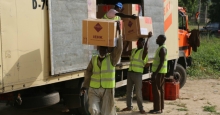
WHO has donated lifesaving medical supplies to three health sector partners responding to the emergency health needs of internally displaced people (IDPs) in Borno State, Nigeria.
Two full Interagency Emergency Health Kits (IEHK) with enough medicines and supplies to provide essential care for 20 000 people for 3 months were donated to the International Rescue Committee (IRC) and Médecins sans Frontières (MSF) Spain. humanitarian health support These kits are being used to support the response in Benisheik hospital and camps in Jere and Maiduguri local government areas. These kits also contained medicines and supplies to prevent malaria and HIV infection.
One Interagency Diarrhoeal Disease Kit (IDDK) and 5 basic IEHKs for 5000 people for 3 months were donated to Médecins du Monde to respond to the needs of IDPs in Kawarmela camp.
“The supplies provided by WHO will be used by IRC’s supported mobile teams to better respond to the dire health care needs of people in Maiduguri Municipal Council and Jere host communities,” says Carmen Yip, Emergency Health Coordinator, IRC in Maiduguri, Nigeria.
“This will enhance IRC’s response by preventing stock-outs of medications as we wait for our international procurements of medications to enter the country. If a stock-out of medications were to happen, our primary health care programme would need to stop.”
Kits sent to potential disease hot spots
Since the start of the crisis in north-eastern Nigeria, WHO has sent 10 Interagency Diarrhoeal Disease Kits (IDDKs) and 7 full Interagency Emergency Health Kits (IEHK) to Borno State Ministry of Health. These are being used to support the Government’s response to the ongoing emergency.
One complete IDDK provides treatment for 100 severe cholera cases, 400 moderate cholera cases, 100 adults and 100 children with shigella dysentery. One full IEHK provides enough essential medicines and supplies to meet the health needs of 10 000 people for 3 months.
“WHO in collaboration with Borno State Ministry of Health will be distributing the remaining IDDK kits to potential cholera hot spots and in all areas where high cases of acute watery diarrhoeal diseases have been reported,” says Dr Rex Mpazanje, acting WHO Country Representative to Nigeria. “In addition, the diarrhoeal and emergency kits will be distributed to partners who are supporting the health response,” he added.
Malaria is highest disease burden
Borno State has experienced numerous outbreaks of acute watery diarrhoea over the past few years; the most recent one was reported in Rann village in Kala-Balge in September 2016. Malaria is the leading cause of illness in all IDP camps and host communities, while acute respiratory tract infections are the second most common disease humanitarian health support.
Weekly disease surveillance reports from WHO’s EWARS system show that malaria and diarrhoea are the most common diseases among IDPs and host communities in Borno State. Supplies from WHO will help the State Ministry of Health to manage such diseases in health facilities. humanitarian health support
WHO and health partners continue to support Borno State Ministry of Health to respond to the health needs of more than 3.7 million people by filling in gaps jointly identified with government counterparts.
Date of Publication: NOV. 2016
SOURCE: WHO

Leave A Comment?